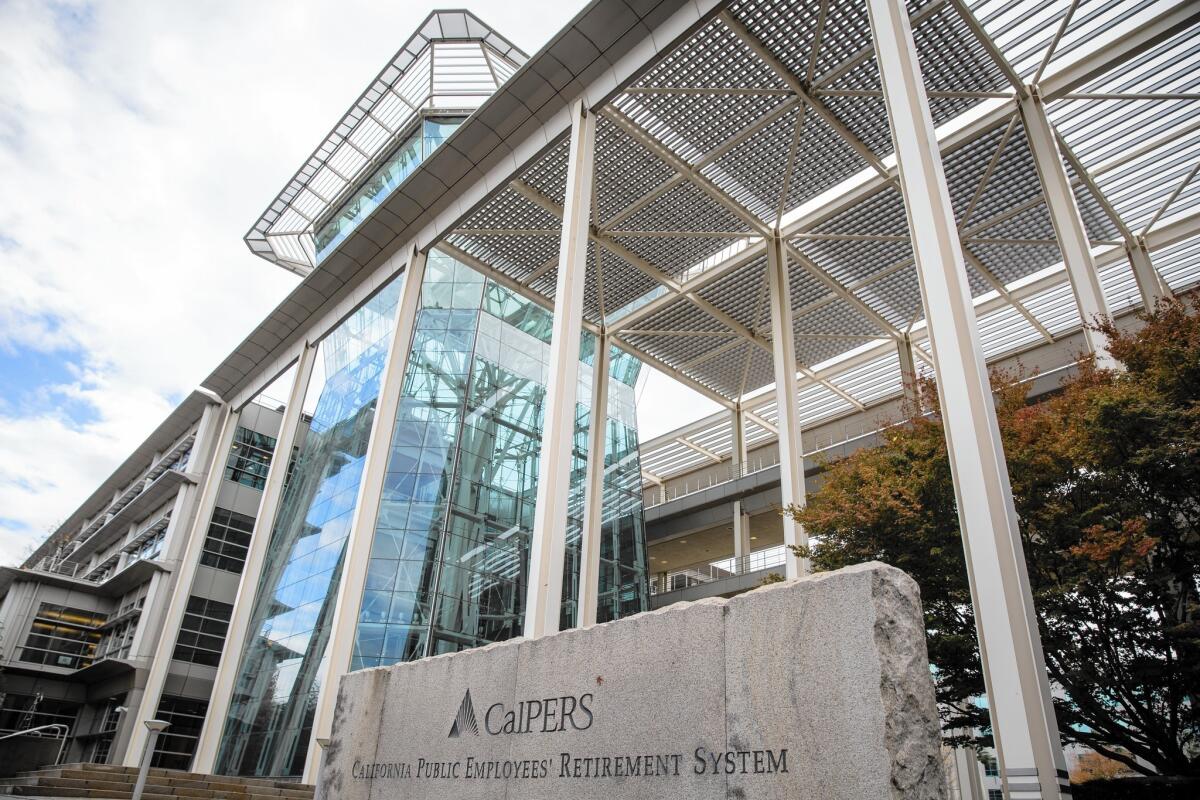California public workers may be at risk of losing promised pensions

As millions of private employees lost their pension benefits in recent years, government workers rested easy, believing that their promised retirements couldn’t be touched.
Now the safety of a government pension in California may be fading fast.
Feeling the heat is the state’s huge public pension fund, the California Public Employees’ Retirement System, known as CalPERS.
The fund spent millions of dollars to defend itself and public employee pensions in the bankruptcy cases of two California cities — only to lose the legal protections that it had spent years building through legislation.
The agency’s most significant setback came in Stockton’s bankruptcy case. The judge approved the city’s recovery plan, including maintaining employees’ pensions, but ruled that Stockton could have legally chosen to cut workers’ retirements.
In his written opinion, U.S. Bankruptcy Court Judge Christopher M. Klein blasted CalPERS as “a bully” for weighing in on the proceeding to insist — wrongly — that the city had no choice but to pay workers their promised pensions.
Karol Denniston, a public finance lawyer at Squire Patton Boggs, said Klein’s ruling was “critical for every municipality in California.”
“Next time we see a Chapter 9 bankruptcy filing,” she said, “pensions will be up for negotiation just like every other creditor.”
The skyrocketing bill for pensions is a problem for cities across the state. Californians now owe nearly $200 billion for pensions promised to state and local government workers, according to an analysis by Adam Tatum, research director at California Common Sense, a nonprofit think tank.
Rising pension costs are eating up money needed for things such as fire trucks and street repairs, Tatum said.
As the focus now shifts 400 miles south — to the city of San Bernardino’s bankruptcy case — the pension fund faces a new legal challenge from two companies owed $50 million. The companies say it’s illegal for the city to continue paying CalPERS to fund workers’ pensions while they get nothing.
“This is significant,” Tatum said. “It has put a chink in CalPERS’ armor.”
San Bernardino could be the first city in California to consider cutting worker pensions in a bankruptcy.
Before Klein’s ruling, San Bernardino officials repeatedly said they planned to keep paying CalPERS for worker pensions. They said they feared that employees would leave for other government jobs if they moved them to a less expensive retirement option.
The city manager confirmed these plans to the Los Angeles Times in February.
But in an interview, San Bernardino City Atty. Gary Saenz said Klein’s opinion was significant.
The city is now drafting a plan for paying its creditors, he said. Although city officials put “a high value” on continuing to pay CalPERS, Saenz said, the issue “is still up in the air.”
In an email, Brad Pacheco, a CalPERS spokesman, said the fund disagrees with Klein’s ruling, but hasn’t decided whether it will appeal.
Pacheco added that CalPERS continues to believe that the ruling has “little significance” because Klein ultimately approved Stockton’s bankruptcy plan, even though it included continued payments to CalPERS to support full workers’ pensions.
“We are not ashamed of our actions to protect the pension promises made to California’s public servants,” Pacheco said. “We disagree that CalPERS ‘bullied’ anyone.”
Part of the problem is that many cities have promised workers pensions that are more generous than those still offered in the private sector. Many government workers retire at 50 or 55 on lifelong payments that can nearly match their salaries if they were longtime employees.
Increasing payments to CalPERS was one reason that Stockton and San Bernardino were forced to file for bankruptcy.
Moody’s, the Wall Street rating firm, warned last fall that the two cities will continue to face financial stress after bankruptcy if they don’t reduce workers’ pensions.
Stockton now pays CalPERS an amount equal to 46% of the salaries of its police and fire staff to cover their future pensions — a payment that will rise to nearly 60% of payroll in five years.
Dave Low, chairman of Californians for Retirement Security, a coalition of 24 public unions, said workers are willing to discuss changes to their benefits during contract negotiations. He noted that Stockton’s workers had agreed to give up the free healthcare they had been promised in retirement — a benefit worth more than $500 million.
“Unions have no interest in seeing their cities go bankrupt,” Low said.
CalPERS’ efforts to protect itself and workers’ retirements began decades ago when it pushed through two state laws with help from the politically powerful unions.
The first law said that a city’s contract with CalPERS could not be canceled in bankruptcy.
The second allowed CalPERS to place a costly lien on a city’s property — in essence, a new and far more expensive bill for pensions — if the city left CalPERS and provided retirement benefits through a different fund.
The cost of the threatened lien was so steep — in Stockton, CalPERS demanded $1.6 billion — that no city in bankruptcy has left the fund.
But Klein ruled that federal bankruptcy law trumped the two state laws. He called the lien “a toothless tiger.”
The two companies challenging San Bernardino’s payments to CalPERS are using a different legal tactic.
Like many cities, San Bernardino borrowed money through bonds to pay CalPERS for pensions. The two companies — Luxembourg-based Erste Europaische Pfandbrief und Kommunalkreditbank and Ambac Assurance Corp. — are owed more than $50 million for those bonds.
The companies argue that since CalPERS received the borrowed $50 million, the debt they hold isn’t legally different from the additional amounts that the city owes to CalPERS and continues to pay. Both CalPERS and the city say the companies’ claims are baseless. The city has asked the court to dismiss the complaint.
Twitter: @melodypetersen
ALSO:
Ted Eliopoulos: CalPERS’ $300-billion man
99 ways to boost pensions in California -- at public cost
Hiltzik: Congress’ backroom pension-cutting deal is even worse than expected
More to Read
Inside the business of entertainment
The Wide Shot brings you news, analysis and insights on everything from streaming wars to production — and what it all means for the future.
You may occasionally receive promotional content from the Los Angeles Times.











